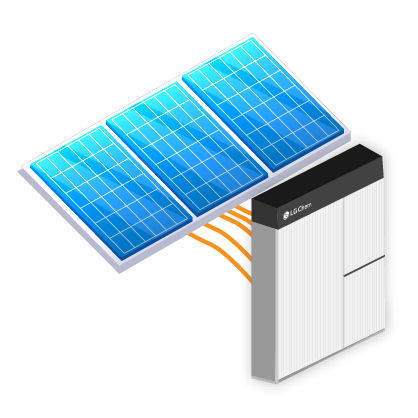Do I Need Solar Batteries?
There are good reasons why batteries are sold separately from residential solar energy systems. First of all, it’s easy to go solar without using batteries. Secondly, even though prices have come down significantly in the last few years, batteries are still too expensive to make sense for US homeowners. Installation can cost $7,000 at the low end, or twice as much at the high end. And the stored energy will cost more than energy from the electric grid.
How Batteries Can Help
In backup situations, batteries can come in handy. With storage installed, your inverter now relies on the battery instead of the grid to power your home. Unfortunately, such a setup with modern lithium-ion batteries currently adds between $7,000 and $15,000 to the price of your solar system. And that still would not buy enough battery capacity to keep all appliances and gadgets in your house on. You have to choose what to run for roughly one day before the battery would be fully discharged. Your solar panels will recharge the battery, but by how much depends on weather conditions. Such a setup does not provide enough power to completely defect from the grid.
When Tesla CEO Elon Musk announced the Powerwall, he made it sound as if you might be able to power your whole home with a battery that costs little more than $3,000. A year later, as the first Powerwalls are hitting the US market, it turns out they cost at least $6,500 installed plus additional fees if you want to retrofit them to an existing solar system. One Powerwall isn’t powerful enough to run your A/C though. For that, you would need at least two. And after ten years you can expect to replace the battery because it will have reached the end of its cycle life. Tesla rates the Powerwall for one daily charge-discharge cycle over the span of ten years.
Other vendors like Sonnen Inc. and Adara Power offer similar battery systems for homeowners with solar panels. None of them have gotten the cost for a kilowatt-hour of stored electricity lower than $0.40.
But, what is a kilowatt hour? Check this video to know more about Kilowatt Hour.
This means that even if you would use free power to charge your battery, just storing it and taking it out later costs you $0.40 per kilowatt-hour. Your local utility sells the same kilowatt-hour for $0.10 to $0.25, depending on where you live in the US. Only Hawaii and Alaska are more expensive. So at the moment, it makes more sense to get electricity directly from your utility if you need it instead of using a battery for times when the sun does not shine.
Those numbers are going to change in the future. Battery prices will come down even more and there might be other ways to make use of their storage capacity than just consuming it yourself. Utilities will pay homeowners to access their batteries because it helps them to smooth out grid fluctuation. It also might make sense to charge the battery at times when electricity is cheap and discharge it when it is expensive. Those use cases are on the horizon, but they are not here yet.
Homeowners who need battery backup because they live in areas with frequent power outages will probably stick to generators for now. Or they go with batteries regardless of the economics. Having peace of mind when the grid goes down is, after all, priceless.








